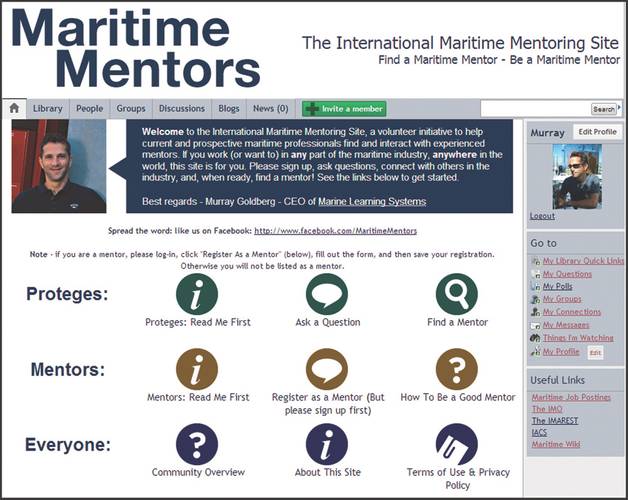Maritime Mentoring
There are very few forms of learning which are as effective and personal as mentoring. And nowhere is mentoring more important than it is in the maritime industry. It is with this in mind that a group of volunteers have created the on-line “International Maritime Mentoring Community” at www.MaritimeMentors.com. This is a 100% volunteer/free site that exists only for the betterment of the maritime industry. If you are a maritime worker, are considering a job in the maritime industry, or if you represent a maritime college or maritime employer, the site is here for you.
This article is an invitation of sorts. An invitation for experienced mariners and shore-side workers to give back to their community by volunteering to mentor an aspiring or progressing maritime employee. It is an invitation to young people considering a maritime career or those whose career progression choices could benefit from the sage advice of someone who has “been there before”. It is an invitation to maritime colleges and maritime employers to set up a presence on the site and offer guidance. It is an invitation for the entire maritime community to come together and support one another for the betterment of the industry as a whole. The industry needs you. Oh - and did I mention that being a mentor takes no special experience (other than maritime experience), requires very little time, and is incredibly satisfying? Just ask anyone who has been a mentor.
Why Do We Need e-Mentoring?
The benefits of mentoring are deep and varied. Mentoring helps with recruitment and onboarding in a new profession. It is a strong form of knowledge sharing. It can contribute to worker retention in the industry, and it contributes greatly to skill development. Mentorship helps people navigate career path choices, understand what it takes to advance and perform, and gives them an insider’s view not generally otherwise available.
Being a mentor has its benefits as well. Aside from the global goal of contributing to and improving the maritime industry, being a mentor can be personally very satisfying. It can extend your professional network, and can even provide opportunities to recruit the best and the brightest. Although mentoring relationships can take a variety of forms, the most traditional (and a very effective) form of mentoring is face-to-face mentoring. However, despite the prevalence and effectiveness of in-person mentoring, its applicability can be limited in the maritime industry.
The problem is that opportunities to interact face-to-face with a maritime mentor are rare due to the isolation of being at sea and the small size of most crews. Add to this the diversity of languages sometimes spoken on-board, and the fact that potential mentors are, more and more, burdened with paperwork and other activities while on-board, opportunities for mentoring junior crew are rare and becoming rarer. Compare a maritime career to a traditional shore-based occupation such as being a teacher or accountant. These professionals typically have access to hundreds of potential mentors in their office and through bodies such as professional associations which meet regularly. Mariners do not.
When mentoring in the maritime industry does happen, it often occurs between people serving on the same vessel, and is typically short-lived because one of the participants sooner or later ends up on a different vessel or different shift. This is a problem because mentoring relationships are most valuable when they are long lived, and when the mentor is not in a position of influence over the protege. Also, on-board mentorship opportunities do not begin until the mariner is actually on-board, yet mentorship can be very useful well before that time. It would be wonderful if new workers and trainees had access to a larger and more stable community of peers and mentors. The world needs more qualified mariners and the availability of a welcoming community where connections can be made and answers can be found will contribute to the fulfilment of that goal.
Fortunately the web has, in the last few years, provided a mechanism for those not physically co-located to interact with one another. That technology can be used to support mentoring relationships - a form of mentoring called e-mentoring.
What is e-Mentoring?
Web-based mentoring (or e-mentoring) is simply mentoring which is facilitated by a web-based application. The main idea, of course, is that traditional mentoring relationships are constrained by time and distance - the mentor and protege must meet at a time and location available to them both. This greatly limits the opportunity to find mentors and maintain a mentoring relationship.
E-mentoring overcomes these barriers. It provides tools for mentors and their proteges to interact without having to meet face-to-face, or for that matter, without even having to be available at the same time. This greatly increases the domain of available mentors for a protege since the mentor could be located anywhere in the world (even in a significantly differing time zone), as long as both parties have reasonable internet access. While it is true that not all mariners do have reliable and continuous access to the internet, the numbers are growing and most certainly have reached a point where e-mentoring is more than viable.
Another benefit of e-mentoring is that it greatly increases opportunities for group and peer mentoring. Group mentoring can greatly improve mentoring efficiency, allowing one mentor to accommodate more proteges. Peer-mentoring enables the exchange of knowledge and experience allowing proteges to learn from one another. In the past, these forms of mentoring have been especially difficult to engage in because the constraints of time and distance are even more difficult to overcome when there are more than two people involved. E-mentoring, because it removes the constraints of time and location, makes group-based and peer mentoring no more complex than one-on-one mentoring
Aside from the difference in how they are conducted, the nature, outcomes and effectiveness of the mentoring interactions are the same for e-mentoring and traditional (face-to-face) mentoring. The only real difference is that e-mentoring interactions are far more flexible in nature, and the field of potential mentors is infinitely larger. Both are good things.
Can E-Mentoring be Personal?
Mentoring relationships - especially the good ones, are very personal, trust-based relationships. The mentor and protege come to know each other very well, come to appreciate one another’s concerns and aspirations, and sometimes reveal information they would tell few other people. As such, it is reasonable to ask whether e-mentoring interactions which take place on-line could ever facilitate the same level of “intimacy” as face-to-face interactions. In other words, can e-mentoring be personal?
The answer is a resounding “yes”. If the social technology revolution has taught us anything over the last 5 or 10 years, it is that people most certainly can form and sustain personal and professional relationships on-line. Not everyone has experienced this yet (including possibly many readers), but it is very true. After all, the necessary ingredient enabling the formation of a mentoring relationship is a pair of compatible people who intend to form such a relationship. Whether they see one another in person, speak using the telephone or skype, or write their comments in e-mail has little effect on their ability to convey their message. As such, why would it have an effect on their ability to effectively engage in a mentoring relationship? It doesn’t. Much like comparing on-line and face-to-face learning, we find that each form of mentoring relationship has its benefits and limitations, but both can be very effective.
A Community is Launched
When the idea of a web-based mentoring community was proposed, I felt as though I would be fortunate if 10 or 15 experienced mentors supported the idea and agreed to volunteer as mentors. I was flabbergasted to ultimately receive responses from nearly 200 amazingly experienced maritime industry workers from every sector of the industry and every corner of the world eager to help. Many of the offers of help were accompanied by articulate arguments supporting the initiative. If I was not previously 100% convinced of the value of e-mentoring, I am certainly convinced now after receiving these and other responses. I’ll not include their names (because I have not asked for permission to quote them), but here are some of the comments I have received in response to the e-mentoring proposal:
“This could be of service to all the young mariners from all over the world. Attracting young and talented people to this profession is getting harder and the maritime industry is facing an acute shortage of qualified seafarers. I am sure seniors who love and have enjoyed this profession can contribute very positively in conveying the adventure and opportunities this profession offers.”
“[We need to encourage women and minorities to get into the industry]. Those are the people who will not have a natural network in the industry and often encounter difficulties. A mentor might be able to intervene at a high level to reduce barriers set up by a lower level employee to prevent advancement by such individuals. ... Such intervention can only come from senior people and often it must come from outside the company. We owe it to the industry to make sure everyone has a chance to contribute.”
“Leaders onboard are failing in standards and neglecting their duties as coach/teacher because of poor upbringing. [They] feel that seafaring is just another ordinary job! Well, we need to overcome these barriers when shaping better mariners for the future.”
And finally, here is a comment that says it all:
“I have inherited this glorious profession as a legacy bequeathed to me by extraordinary men of the maritime profession who lived very ordinary lives. Tell me how can I repay even a fraction of this debt. I shall be honored.”
Hopefully some of these reasons for offering to be a mentor resonate with you and provide an incentive to offer a bit of your time.
Visiting the International Maritime Mentoring Community
When (I am an optimist and therefore did not say “if”) you visit the maritime mentoring community, you will find mentors representing over 4,000 years of maritime experience ready to be freely shared.When a mentors registers, they are asked to list their areas and depth of maritime experience, and are asked to indicate their gender, country of residence, and a few other bits of information. All this is meant to help proteges determine which mentors may be useful to them in the career choices they are facing.
Proteges then visit the site and click a button labeled “find a mentor”. There they are asked to indicate the kinds of expertise they are looking for and are presented with a list of matching mentors. It is then up to the protege to connect with the mentor and, if accepted as a protege, join the mentor’s “mentoring group” - an area where all of his or her proteges can congregate and share experiences.
The site also houses a library for mentors and proteges to share useful documents and links pertaining to careers in the maritime industry. Some mentors have begun to write blogs on the site, and the discussion area has topics including maritime schools, careers, and others.
What’s Next?
The site is up and going. Mentors are there and proteges are there. But this initiative will only be as successful as the number of members there. So at this time we are embarking on a few initiatives to reach out primarily to maritime schools and employers.
Maritime Colleges
We are inviting all maritime colleges to have a presence on the mentoring site. Each college is welcome to create a group (or ask us to do so) dedicated to their college and have one or more faculty representatives periodically visit the group to answer questions. This would allow proteges on the site to interact with the college and gain some insight into what it would be like to study there. In addition, the college can offer their cadets a "Meet a Mariner" program of sorts. Their students are invited to visit the community, join their dedicated college group, and interact with mentors in order to help guide their careers upon graduation.
Maritime Employers
Similar to colleges, we are inviting all maritime employers to create a group dedicated to their company. Proteges who would like to find out more about what your company has to offer can join and interact with representatives from your organization. Ideally those representatives could provide a combination of generally useful career advice in addition to information on working at your company.
I will start in the same way as I began - with an invitation. This is a wonderful industry with a deep and profound mentoring tradition. Every single reader has the opportunity to improve the industry by joining the site as either a mentor or protege. We all have something to give, and something to learn. There is no downside. Please visit the International Maritime Mentoring Community. Join, share, support and learn at www.MaritimeMentors.com
(As publsihed in the November 2012 edition of Maritime Reporter - www.marinelink.com)


















